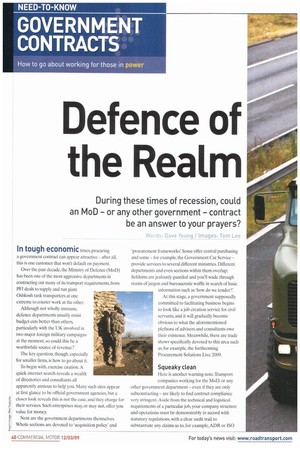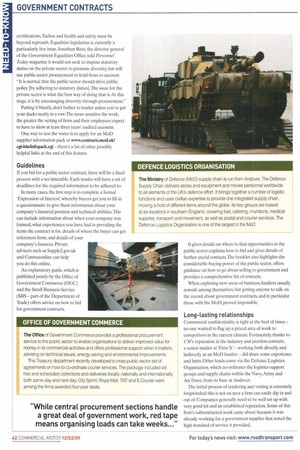During these times of recession, could an MoD or any other government contract be an answer to your prayers?
Page 40

Page 42

Page 43

If you've noticed an error in this article please click here to report it so we can fix it.
Words: Dave Young / Images: Tom Lee In tough economic times, procuring a government contract can appear attractive after all, this is one customer that won't default on payment.
Over the past decade, the Ministry of Defence (MoD) has been one of the most aggressive departments in contracting out many of its transport requirements, from PFI deals to supply and run giant Oshkosh tank transporters at one extreme to courier work at the other. Although not wholly immune, defence departments usually resist budget cuts better than others, particularly with the UK involved in two major foreign military campaigns at the moment, so could this be a worthwhile source of revenue?
The key question, though, especially for smaller firms, is how to go about it. To begin with, exercise caution. A quick internet search reveals a wealth of directories and consultants all apparently anxious to help you. Many such sites appear at first glance to be official government agencies, but a closer look reveals this is not the case, and they charge for their services Such enterprises may, or may not, offer you value for money.
Next are the government departments themselves. Whole sections are devoted to 'acquisition policy' and 'procurement frameworks'. Some offer central purchasing and some for example, the Government Car Service provide services to several different ministries Different departments and even sections within them overlap: fiefdoms are jealously guarded and you'll wade through reams of jargon and bureaucratic waffle in search of basic information such as 'how do we tender?: At this stage, a government supposedly committed to facilitating business begins to look like a job creation service for civil servants, and it will gradually become obvious to what the aforementioned plethora of advisers and consultants owe their existence. Meanwhile, there are trade shows specifically devoted to this area such as, for example, the forthcoming Procurement Solutions Live 2009.
Squeaky clean
Here is another warning note. Transport companies working for the MoD, or any other government department even if they are only subcontracting are likely to find contract compliance very stringent. Aside from the technical and logistical requirements of a particular job, your company structure and operations must be demonstrably in accord with statutory regulations, with a clear audit trail to substantiate any claims as to, for example, ADR or ISO certifications. Tachos and health and safety must be beyond reproach. Equalities legislation is currently a particularly live issue. Jonathan Rees, the director general of the Government Equalities Office, told Personnel Today magazine it would not seek to impose statutory duties on the private sector to promote diversity, but will use public sector procurement to hold firms to account: "It is normal that the public sector should drive public policy [by adhering to statutory duties].The issue for the private sector is what the best way of doing that is. At this stage, it is by encouraging diversity through procurement."
Putting it bluntly, don't bother to tender unless you've got your ducks neatly in a row.The more sensitive the work, the greater the vetting of firms and their employees; expect to have to show at least three years' audited accounts.
One way to test the water is to apply for an MoD supplier information pack at www.contracts.mod.tik/ egi-bin/infopadc.cgi there's a list of other possibly helpful links at the end of this feature.
Guidelines
If you bid for a public sector contract, there will be a fixed process with a set timetable. Each tender will have a set of deadlines for the required information to be adhered to.
In many cases, the first step is to complete a formal 'Expression of Interest', whereby buyers get you to fill in a questionnaire to give them information about your company's financial position and technical abilities. This can include information about when your company was formed, what experiences you have had in providing the items the contract is for, details of where the buyer can get references from, and details of your company's finances. Private advisers such as Supply2.gov.uk and Contraxonline can help you do this online.
An explanatory guide, which is published jointly by the Office of Government Commerce (OGC) and the Small Business Service (SBS part of the Department of Trade) offers advice on how to bid for government contracts. It gives details on where to find opportunities in the public sector; explains how to bid and gives details of further useful contacts.The booklet also highlights the considerable buying power of the public sector, offers guidance on how to go about selling to government and provides a comprehensive list of contacts.
When exploring new areas of business, hauliers usually consult among themselves, but getting anyone to talk on the record about government contracts, and in particular those with the MoD, proved impossible.
Long-tasting relationships
Commercial confidentiality is tight at the best of times no one wanted to flag up a prized area of work to competitors in the current climate. Fortunately, thanks to CM's reputation in the industry and peerless contacts, a senior insider at 'RIM X' working both directly and indirectly as an MoD haulier did share some experience and hints. Other loads come via the Defence Logistics Organisation, which co-ordinates the logistics support groups and supply chains within the Navy, Army and Air Force, from its base at Andover.
The initial process of tendering and vetting is extremely longwinded; this is not an area a firm can easily dip in and out of. Companies generally need to be well set up with very good kit and an established reputation. Some of this firm's subcontracted work came about because it was already working for a government supplier that noted the high standard of service it provided. Firm X has carefully targeted the government work it does, warning that the more general the nature of the transport task the less competitive the rates. Some of its work is obtained via the 'Freight-X' European Freight Exchange intemet portal, which has a discreet defence section accessible only to approved contractors.
Firm X isn't large enough to tender directly for entire contracts in the way that companies such as Palletways and Serco do, but is registered as an approved supplier.
With 15 years' experience, it is apparent to Firm X that while central procurement sections handle a great deal of government work, red tape means organising loads can take weeks and, consequently, individual departments have the power to short-circuit this process in an emergency by arranging haulage directly. They are only likely to do this with firms with which they have a long working relationship and basis of trust.
Firm X doesn't see its government work as a mainstay. "we couldn't be reliant on itrather as a valuable adjunct to optimising the use of its specialist fleet. Rates can be good, but the government isn't an easy touch, "they know how to buy" and it's not in a firm's interests to jeopardise long-term work by hiking prices on 'hurry up' jobs.
"The more open the procurement system, the more likely rates are to be forced down," says our contact, explaining why his company sticks to niche tasks.
In addition to helping shift equipment at times of military engagement there's steady work from servicing training exercises and routine supply jobs. In short, once admitted to this tight, low-profile community, government work can provide an element of security and the longer and better firms do it, the more likely they are to get more complex, higher-remunerated jobs. "We've worked towards this for a long time, it does give us an element of security," says CM's industry source. Just keep it quiet. III




















































































































































